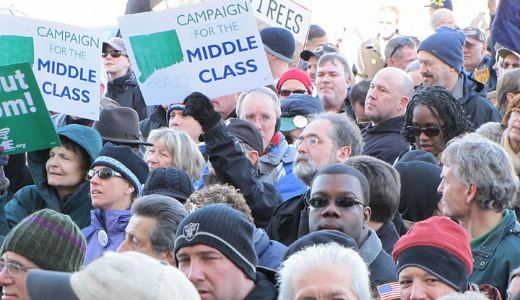
State workers in Connecticut are in a pitched battle to save their jobs and the services they provide.
In May, the state legislature passed a budget on the assumption that an agreement reached by state workers’ unions and Gov. Dannel Malloy, a Democrat, would be ratified. The compact averts layoffs, instead bridging the deficit with $1.6 billion in concessions over two years.
Leaders of the 15 unions in SEBAC (State Employee Bargaining Agent Coalition) unanimously urged a “yes” vote as the best that could be achieved in the present climate. Progressive forces warned that, while state workers should never have been put into the position of taking the biggest hit in the budget crisis, voting “no” would result in an even worse situation for state workers and create deep divisions.
The Republicans and tea partiers opposed the agreement. They wanted more cuts and less bargaining rights for state workers. They went into high gear with a cynical public misinformation campaign telling state workers they would lose their current health care plan and they should “vote no.”
The “vote no” campaign is spearheaded by the right-wing Yankee Institute and former Republican Gov. John Rowland, now a talk show host after having served prison time for corruption. It is aimed at creating disunity and divisions within and between the unions.
Eleven of the unions and 57 percent of the members voted to ratify the agreement. However, SEBAC bylaws require 14 unions and 80 percent of members to approve. The June 30 budget deadline did not allow time for a re-vote.
In special session on Thursday, the legislature adopted a new budget including 7,500 layoffs. It rejected proposals to cut funds for local government and tabled a measure to restrict union bargaining rights. At the same time, they extended the deadline for SEBAC to ratify the original agreement to August 30 so that a re-vote will be possible. If SEBAC ratifies the agreement, the layoffs will not go into effect.
Missing from discussion at the special session was the failure of the original budget deal to tax Connecticut’s multi-millionaires. The $1.6 billion budget gap could be closed with a tax on multi-millionaires who can afford it. Then no cuts in vital programs or layoffs of state workers would be required.
Without this proposal on the table, the only choices were various combinations of layoffs, cuts in services and givebacks by state workers.
The need to tax the rich and close corporate loopholes was raised from the floor at every one of 17 town hall meetings held across the state by the governor. It was raised at demonstrations, rallies, press conferences and lobbying sessions with legislators. This pressure forced a shift away from taxes on middle-income families to top earners, but the tax rate for the few highest income earners remains low.
The state budget shortfall is linked to the national economic crisis, worsened when the Republican Congress ended federal aid to states, and extended Bush-era tax cuts to the super rich.
Two facts point the way out: 1) Those with incomes over $1 million had the smallest tax increase in Connecticut’s budget deal this year. 2) Those with incomes over $1 million got a 4.6 percent windfall from Congress last December.
Instead of competing with other states in a race to the bottom, the solution is to increase Connecticut’s revenue with an additional 4.6 percent tax on the portion of incomes over $1 million per year. This would bring at least $1.6 billion per year in new revenue – enough to avoid any cuts in the state workforce or services, and enough to increase funding to reverse layoffs at the municipal level.
Even then, those with millionaire and billionaire incomes would pay a smaller part of their income in total Connecticut taxes than everyone else.
Right-wing think tanks, media and Republicans in the state legislature want to create disunity so they can cut workers’ collective bargaining rights. Now is the time for all working people to raise their voices and tell the governor and legislature to do what is good for all of Connecticut – tax the super rich.
Photo: Rally at State Capitol in Hartford, Conn., in solidarity with state workers in Wisconsin and Connecticut. Henry Lowendorf/PW













Comments